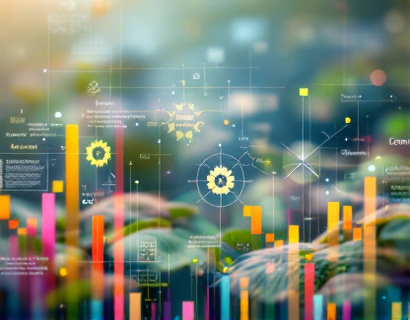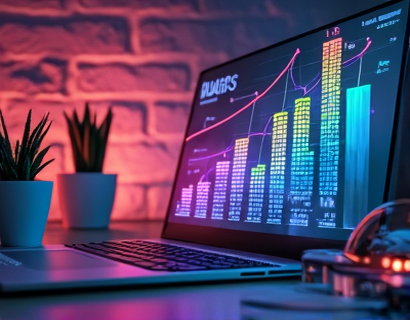AI and Crypto: Transforming App Ecosystems for Enhanced Productivity and Digital Innovation
The intersection of artificial intelligence (AI) and cryptocurrency is revolutionizing the way we interact with digital applications and services. This convergence is not just a technological curiosity but a transformative force that is redefining app ecosystems, enhancing productivity, and driving digital innovation. For tech-savvy professionals and early adopters, understanding this synergy is crucial to staying ahead in a rapidly evolving digital landscape.
At the core of this transformation is the integration of AI into cryptocurrency-driven platforms. AI technologies, such as machine learning and natural language processing, are being harnessed to create smarter, more intuitive, and highly efficient applications. These applications leverage blockchain technology and cryptocurrency to ensure security, transparency, and decentralization, which are essential for building trust and fostering innovation.
Enhanced Security and Trust
One of the primary benefits of combining AI and cryptocurrency in app ecosystems is the enhanced security and trust they provide. Blockchain technology, the backbone of cryptocurrency, offers a decentralized and immutable ledger that ensures data integrity and prevents tampering. AI algorithms can further bolster security by detecting and mitigating potential threats in real-time, such as fraudulent transactions or malicious activities.
For instance, AI-powered security systems can analyze patterns and anomalies in user behavior to identify and block suspicious activities before they cause harm. This proactive approach to security is particularly valuable in financial applications, where the stakes are high and the need for robust protection is paramount. By integrating AI with blockchain, apps can provide users with a higher level of confidence in the safety and reliability of their digital transactions.
Personalization and User Experience
AI-driven personalization is another key area where the fusion of AI and cryptocurrency is making a significant impact. Cryptocurrency and blockchain technologies enable the creation of decentralized identity systems, which allow users to maintain control over their personal data. AI algorithms can then use this data to provide highly personalized experiences without compromising privacy.
For example, a decentralized social media platform can use AI to curate content based on a user's preferences and interactions, while ensuring that the user's data remains encrypted and securely stored on the blockchain. This not only enhances the user experience but also empowers users to have greater control over their digital footprint. The combination of AI and cryptocurrency thus creates a win-win scenario where users enjoy tailored services and developers can build more engaging and trustworthy applications.
Decentralized Applications (DApps)
Decentralized applications, or DApps, are a prime example of how AI and cryptocurrency are reshaping app ecosystems. DApps operate on blockchain networks, leveraging smart contracts to automate and enforce agreements without the need for intermediaries. AI enhances DApps by providing intelligent automation, predictive analytics, and advanced user interfaces.
In the realm of finance, decentralized finance (DeFi) platforms are using AI to optimize trading strategies, manage risks, and provide personalized financial advice. These platforms can analyze market trends, predict price movements, and execute trades with minimal human intervention, all while ensuring transparency and security through blockchain technology. For tech-savvy users, DeFi offers a new paradigm of financial services that are more accessible, efficient, and user-friendly.
Smart Contracts and Automation
Smart contracts, a fundamental component of blockchain technology, are being augmented by AI to create more sophisticated and autonomous applications. Smart contracts are self-executing contracts with the terms of the agreement directly written into code. When combined with AI, these contracts can adapt to changing conditions and make decisions based on real-time data.
For instance, in supply chain management, AI-driven smart contracts can monitor the movement of goods, predict delays, and automatically adjust payment terms or insurance claims. This level of automation not only streamlines processes but also reduces the potential for human error and fraud. For businesses and developers, this means more reliable and efficient operations, leading to increased productivity and cost savings.
Data Analytics and Insights
AI and cryptocurrency are also transforming data analytics within app ecosystems. Blockchain's transparent and immutable nature ensures that data is reliable and tamper-proof, while AI algorithms can process and analyze vast amounts of data to uncover valuable insights. This combination enables apps to provide deeper insights into user behavior, market trends, and operational efficiencies.
For example, a health and wellness app can use AI to analyze user data stored on the blockchain, identifying patterns and providing personalized health recommendations. The transparency of blockchain ensures that users can trust the data and the insights derived from it. This level of data-driven decision-making is invaluable for both users and developers, driving innovation and enhancing the overall value of digital applications.
Incentivization and Tokenomics
The integration of cryptocurrency in app ecosystems introduces new models of incentivization through tokenomics. Tokens can be used to reward users for contributing value to the platform, such as providing content, participating in governance, or completing tasks. AI can optimize token distribution and incentivization strategies to maximize user engagement and platform growth.
For instance, a content creation platform can use AI to analyze user contributions and allocate tokens based on the quality and impact of the content. This not only motivates users to produce high-quality content but also ensures that the most valuable contributions are recognized and rewarded. The use of cryptocurrency in tokenomics adds a layer of transparency and fairness, as all transactions are recorded on the blockchain.
Challenges and Considerations
While the convergence of AI and cryptocurrency offers numerous benefits, it also presents challenges that need to be addressed. One of the primary concerns is the regulatory landscape, as both AI and cryptocurrency are still evolving areas with varying levels of regulation across different jurisdictions. Developers and businesses must navigate these regulations carefully to ensure compliance and avoid legal issues.
Another challenge is the technical complexity involved in integrating AI and blockchain technologies. Building robust and scalable systems requires expertise in both domains, which can be a barrier for some developers. However, as the ecosystem matures, more tools and frameworks will become available, making it easier to develop and deploy AI-powered cryptocurrency applications.
Future Prospects
The future of app ecosystems is bright with the continued integration of AI and cryptocurrency. As technology advances, we can expect to see even more innovative applications that leverage the strengths of both domains. The potential for creating decentralized, secure, and highly personalized digital services is immense, opening up new possibilities for tech-savvy professionals and early adopters.
Moreover, the growing adoption of blockchain and AI technologies indicates a shift towards a more decentralized and data-driven digital world. Apps that embrace this transformation will be better positioned to meet the evolving needs of users, drive innovation, and capture market share. For those looking to stay ahead, understanding and embracing the synergy between AI and cryptocurrency is essential.
In conclusion, the convergence of AI and cryptocurrency is not just a technological trend but a fundamental shift in how we build and interact with digital applications. By enhancing security, personalization, automation, and data analytics, this synergy is transforming app ecosystems and paving the way for a more efficient, innovative, and user-centric digital future.











































